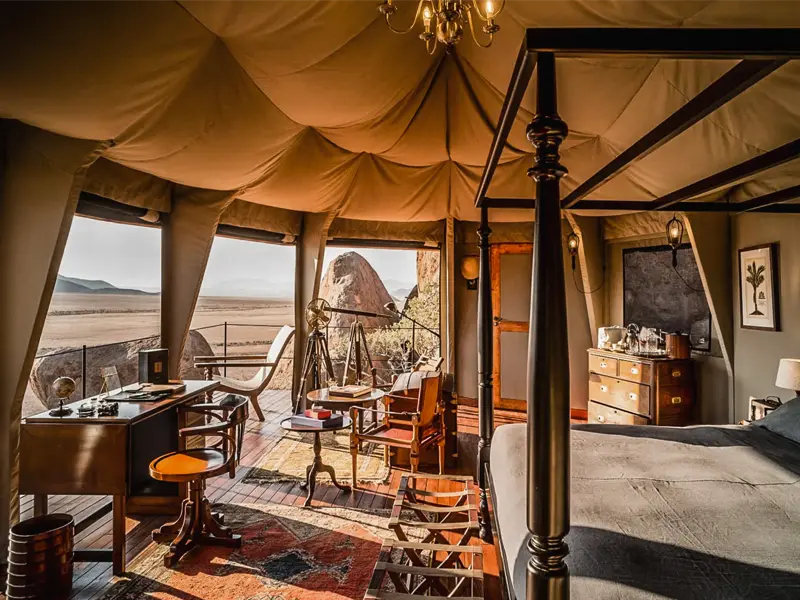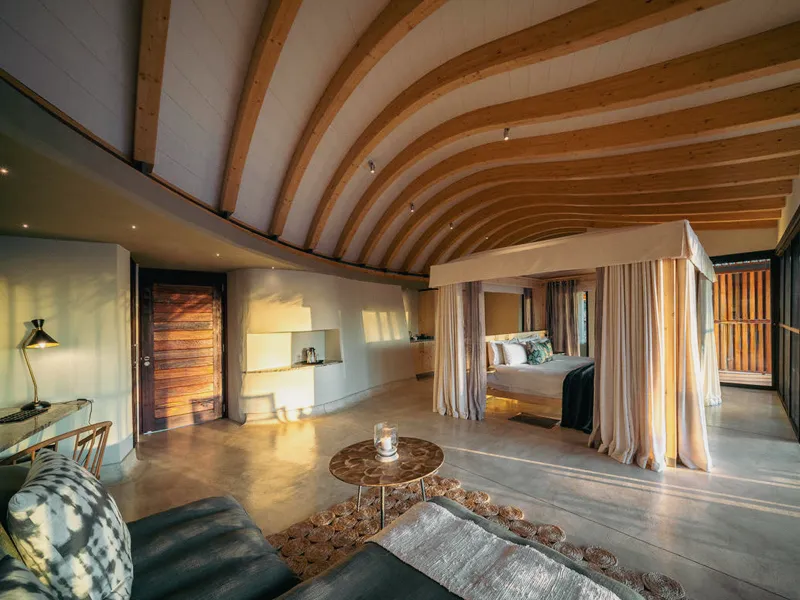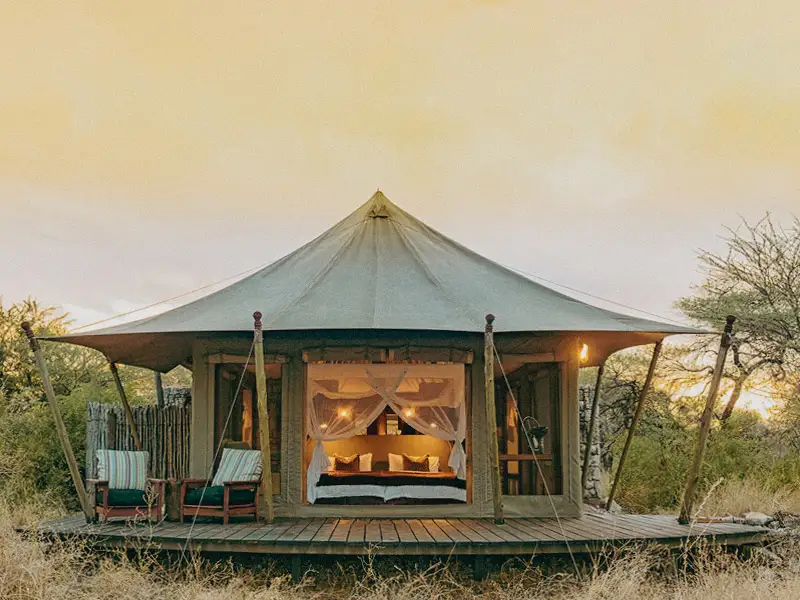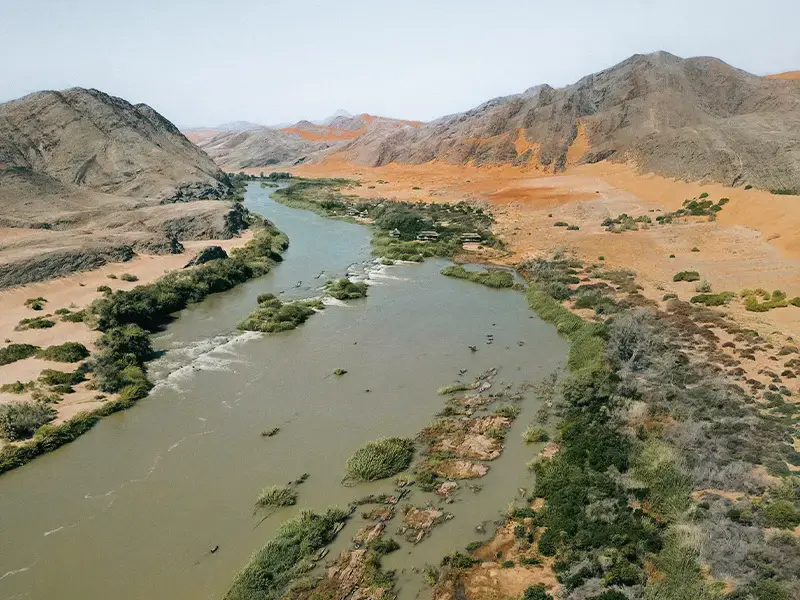The Best Hotels in Namibia
The most exceptional places to stay
Handpicked, Tested & Approved
Towering sand dunes, extraordinary wildlife, and dramatic landscapes. Prepare to be impressed by Namibias vastness, rugged beauty, and untamed wilderness. Explore our carefully curated collection of the most outstanding desert lodges and safari camps for truly unforgettable Namibian adventure.







A soulful sanctuary blending safari adventures with wellness and cultural immersion, overlooking the vast Kalahari plains
1
Habitas Namibia
Khomas (Windhoek)
Upon landing in Windhoek, a mere 45-minute drive takes you to Habitas Namibia. The lodge is perched on a hilltop with majestic Kalahari views, within a vast 50,000-hectare wildlife conservancy. Each of the 12 tented Savanna Rooms, set along a rugged hillcrest, open on all sides to forge a seamless connection with the surrounding nature and provide spacious private decks. A sociable, laid-back communal area features an open-plan restaurant, a snug lounge, complemented by extensive outdoor spaces with loungers and daybeds, fire pits, and the rock-edged infinity pool, all providing stunning vistas of the acacia-dotted plains. Food is fresh, light, and healthy, with some nights featuring barbecue-style bush braais with live music. As Habitas' first property in Africa, the lodge offers a new take on the traditional safari experience with a focus on community bonding and cultural exchange in a relaxed setting. Beyond daily safari game drives through the reserve, you can join a variety of wellness activities such as sunrise yoga and meditation. The experience is enriched further with drumming and dance ceremonies, culinary workshops, and creative painting sessions, inviting you to leave with memories that go far beyond the ordinary safari.











You can’t stay much closer to Sossusvlei’s iconic dunes
2
Little Kulala
Sossusvlei
Nestled within the 27,000-hectare Kulala Wilderness Reserve, neighboring Namib Naukluft National Park, Little Kulala blends luxury with eco-sustainability, amidst the captivating desert landscape next to the iconic red dunes of Sossusvlei. Managed by Wilderness, the lodge exudes an air of refined intimacy, drawing on local influences through its use of natural materials. Each of the 11 thatched kulala chalets offers expansive verandas with private plunge pools, providing uninterrupted views of the surrounding dunes. Air conditioning, indoor and outdoor showers, and a roll-out bed for afternoon siestas or nightly stargazing complete the immersive desert experience. Little Kulala is all about connecting with the desert: explore the mesmerizing landscape through guided 4x4 drives to Sossusvlei, Dead Vlei, and Sesriem Canyon via a private access gate, or enjoy quad biking, nature walks, and sundowner drives led by knowledgeable guides. Back at the lodge, indulge in the genuine hospitality of the staff, unwind by the pool, and embark on a delightful culinary journey accompanied by an extensive selection of fine wines.









Experience the raw beauty of Fish River Canyon from this cliffside lodge at the «Edge of Eternity»
3
Fish River Lodge
Fish River Canyon
Perched majestically on the western edge of the world's second-largest canyon, Fish River Lodge offers unparalleled views of one of Africa’s most dramatic landscapes. Crafted with natural materials and earthy tones, the lodge exudes a rustic elegance that blends effortlessly into its rugged surroundings. Twenty expansive yet understated chalets, each featuring large glass doors and private verandas, perch directly along the canyon’s cliff. Imagine waking up to the sweeping vistas or stargazing from your open-air shower. On hot days, the refreshing infinity pool provides a welcome respite, while the cozy bar and restaurant with fireplace, offers an inviting retreat during cooler evenings. Meals are deliciously down-to-earth, yet infused with a contemporary twist. Beyond the lodge, explore the canyon’s rim on foot to discover rare Quiver trees, or join scenic 4x4 sundowner drives to take in panoramic views. On a full-day hike or drive deep into the canyon, uncover its fascinating geology and ancient history, before cooling off in hidden rock pools. For the truly adventurous (and fit), the 3-day Rim to River hike promises an unforgettable experience, complete with glamping nights at Camp Eternity and Camp Edge.








Step into a bygone era of elegance, surrounded by the vast serenity of the Namib Desert
4
Zannier Sonop
Namib-Naukluft-Park
Set in the southern reaches of Namibia, this extraordinary lodge recreates the glamour of a 1920s safari, immersing guests in a world of refined luxury against the stark beauty of the surrounding desert. Tucked away amid the ancient granite boulders of the Namib Desert, Sonop offers a secluded haven of elegance and adventure. The lodge’s ten lavish tents are perched atop a rocky outcrop, with panoramic views that extend over endless desert plains. Each suite is meticulously furnished with vintage antiques, Persian carpets, and copper bathtubs, evoking the charm of a bygone era while offering every modern comfort. A private deck allows for peaceful moments of wildlife viewing and stargazing, while the spacious interiors feature every detail, from writing desks to luxurious four-poster beds. Days at Sonop are tailored for exploration and indulgence: scenic drives that unveil the stunning landscape around the lodge, e-bike excursions and horse riding across the sands. Return to the lodge to unwind at the stunning infinity pool or savor gourmet cuisine in the dining tent, illuminated by lantern light. Complete the experience with a visit to the spa or a private cinema night under the stars. At Sonop, each moment is crafted to celebrate the magic and serenity of the desert.









Where rugged landscapes meet refined comfort, under the watchful gaze of the Brandberg
5
Onduli Ridge
Damaraland
Onduli Ridge, inspired by the local giraffe inhabitant, sits gracefully at the junction of two south-facing granite landmarks linked by a ridge. From here, guests can bask in the breathtaking panorama of Namibia's tallest peak, the Brandberg, to the south, and the scattered majestic granite inselbergs to the north. The camp's six suites are seamlessly tucked among the granite boulders that embrace the area. Guests have the option to fully open louvered shutters, melding the indoor ambiance with the raw beauty of nature, or to close them for utmost seclusion. As desired, guests can move the bed to their private deck for a night beneath a mesmerizing starlit sky. It boasts spacious rooms, a well-stocked library, refreshing rain showers, and countless relaxation spots. Delectable meals, served after exciting adventures, complete the experience—promising an unparalleled stay that melds impeccable luxury with the pure essence of nature.










A front-row seat to Damaraland’s untamed landscapes and desert-adapted wildlife
6
Damaraland Camp
Damaraland
Damaraland Camp, a wonderful collaboration between Wilderness and the Torra Conservancy community, is a beacon of sustainable tourism in Namibia. Opened in 1996 and managed entirely by native Namibians, the camp has gained renown for its exceptional service, deep knowledge of the land, and immersive wildlife experiences, including tracking the elusive desert-adapted elephants. Located in the dramatic Huab River Valley, Damaraland Camp offers a serene escape amid rugged beauty, characterized by craggy mountains, expansive plains, and star-studded skies. The camp features ten adobe-style, thatched chalets, each raised on wooden decks to preserve the natural vegetation, and with large verandas perfect for soaking in the vistas. The main lodge, built from stone and wood, houses a bar, dining area, and a pool, creating a relaxed atmosphere. Activities range from game drives and guided nature walks to mountain biking and excursions to the Twyfelfontein rock engravings. Damaraland Camp is renowned for its opportunities to track the elusive desert-adapted elephants and other wildlife that thrive in this arid environment. Conservation efforts have flourished, with the camp supporting community projects, reducing poaching, and fostering sustainable water practices, making Damaraland Camp a model of eco-tourism.










Experience the magic of Etosha with unparalleled access and serene luxury
7
Anderssons at Ongava
Etosha
Located on the southern edge of Etosha National Park, Ongava is one of Namibia's premier private game reserves, renowned for its commitment to conservation and outstanding game-spotting opportunities. Anderssons at Ongava, features nine spacious and contemporary chalets, each boasting a private deck with sweeping views of the surrounding savannah. The lodge offers a range of activities, including game drives within the reserve, guided nature walks, rhino tracking, and excursions into neighboring Etosha National Park. One of its standout features is the active waterhole, accessible via a sunken photographic hide for capturing remarkable wildlife moments up close. The open-air bar and dining area, centered around a welcoming fireplace, offer uninterrupted views of the bustling waterhole, where you can enjoy dinner as lions, zebras, and giraffes gather for a drink. A refreshing infinity-edge pool provides the perfect setting to relax while watching the ever-changing wildlife scenes. Additionally, the onsite Ongava Research Centre offers an educational glimpse into the conservation efforts to protect the region’s diverse species. With the lodge being fenced, it is a family-friendly place to stay that ensures safety while offering an immersive experience in nature.









A refined oasis where luxury and wildlife converge around a captivating waterhole
8
Onguma Tented Camp
Etosha
On the eastern boundary of Etosha National Park, enveloped by African bushveld, lies the exquisite Onguma Tented Camp. This haven, sculpted with contemporary design amidst age-old nature, exudes an air of intimate wilderness. Here, luxury effortlessly weaves with the rugged beauty, offering a poetic retreat to its guests. Each tent, draped in earthy tones and sophisticated comforts, boasts a unique perspective on the camp's private waterhole. It's not uncommon for visitors to be treated to the graceful ballet of wildlife—giraffes sipping, lions lazing, and zebras parading—as they lounge on their decks. Beyond the tents, Onguma’s safaris unlock the secrets of Etosha, bringing the African narrative to life in vivid detail. In this serene setting, an air of sophisticated dining enhances the experience, as the day's rhythm unfolds around a watering hole some 60 meters distant. The enveloping natural beauty invites guests to spend leisurely afternoons lounging on comfortable sofas, absorbed in the tranquil observation of wildlife.










One of the most remote camps in Africa, with boating on the Kunene and encounters with the Himba people
9
Serra Cafema
Kaokoveld
Tucked away on the banks of the Kunene River, Serra Cafema gazes across the Angolan border. Nestled in Namibia's remote north, amidst the stark beauty of Kaokoveld, it stands as one of Southern Africa's most secluded escapes and you'll only reach it by light aircraft followed by a thrilling 4x4 transfer. Eight exquisite chalets, perched on stilts, offer an intimate escape. Their spacious interiors boast elegant design and captivating wallpapers depicting the Himba people. Expansive private decks invite you to unwind amidst stunning vistas of the river, volcanic rock formations, and soaring dunes. Boat cruises on the Kunene River (seasonal) provide opportunities to observe waterbirds, crocodiles, and local farmers along the water. Authentic engaging with a Himba community, Namibia's last semi-nomads, and learning more about their culture, is a truly memorable experiences. Excursions also include adventurous quad biking over the undulating dunes, nature walks, and drives into the harsh Hartmann Valley and Marienfluss Mountains. Serra Cafema is a place unlike any other in Namibia.







An otherworldly retreat on the edge of Namibia’s most hauntingly beautiful landscape.
10
Shipwreck Lodge
Skeleton Coast
Shipwreck Lodge, inspired by the iconic shipwrecks of Namibia's Skeleton Coast, stands as a solitary testament to splendor.Set against the sprawling dunes and the chilling embrace of the Atlantic, the Skeleton Coast offers an unmatched, raw glimpse of Africa. Matching the coast's dramatic vistas, the ten chalets have been designed to resemble the shipwrecks that are scattered along the coast. Inside, the snug bedroom boasts wooden ceilings and a small heating stove to keep you warm during chilly evenings. The heart of the lodge boasts the cozy lounge and restaurant, where large glass fronts provide an unobstructed view of the sand dunes and the Atlantic ocean. Venture on river bed drives to spot desert fauna, uncover unique desert plants, watch sunsets over the dunes, hunt for ancient shipwreck remnants on the beach, and stand in awe before the Clay Castles. Exciting quad biking, sand boarding and lovely beach lunches are on offer too. There is no road to the lodge, self drive guest will park the car at Möve Bay and will be picked up from there by the lodge.
Travelling to Namibia
Get ready for the breathtaking landscapes of Namibia, where endless sand dunes, rich wildlife, and vibrant cultures invite you on an unforgettable journey.
Why you should explore Namibia
Namibia is a destination like no other, offering vast, untamed landscapes that evoke a sense of endless adventure. The towering dunes of Sossusvlei, the highest in the world, create a surreal, awe-inspiring desert scene that’s a must-see. Along the eerie Skeleton Coast, shipwrecks and windswept beaches tell tales of a mysterious, rugged coastline. Culture lovers will be drawn to Damaraland, where ancient traditions and art, such as the UNESCO-listed rock engravings at Twyfelfontein, offer a window into Namibia's rich heritage. For wildlife enthusiasts, Etosha National Park is a highlight, where you can spot elephants, lions, rhinos, and more against a backdrop of striking salt pans. Namibia is not only rich in natural wonders and cultural experiences, but it’s also considered one of the safest African countries for travelers. Whether you’re after adventure, wildlife, or cultural immersion, Namibia offers an unforgettable experience in a beautifully untouched setting.


FAQs about Namibia travel
We've addressed the most common travel topics related to Namibia, from getting there and around, to understanding local customs and ensuring health and safety during your trip.
When is the Best time to visit Namibia
Namibia is a year-round destination, characterized by its typical semi-desert climate and two distinct seasons. The dry winter months from May to October are usually the best time for wildlife viewing, especially in Etosha, as animals are drawn to waterholes so you can spot them easier. The weather is sunny during the day (20°C to 30°C), but can get freezing at night. Bring warm clothes and additional layers for morning and evening activities. June to August are the coldest, but it's perfect for stargazing due to the clear skies. These months are also peak season, so expect higher prices and book your flights and accommodation early. The rainy summer from November to March is the best time to see migratory birds, new-born animals, desert flowers and to enjoy the greener vegetation. The weather is hot and humid (up to 45°C) with occasional thunderstorms and potential floodings, but you can take advantage of fewer visitors and off-season rates.
How do I get to Namibia?
Most visitors fly to Namibia: The most convenient connections to Windhoek are through Johannesburg or Cape Town, offering multiple flights daily. Currently, there are just a few direct long-haul flights to Namibia, including:
- Discover Airlines (Lufthansa) from Frankfurt (FRA)
- Qatar Airways from Doha (DOH)
- Ethiopian Airlines from Addis Abbeba (ADD)
Hosea Kutako Airport is relatively small, ensuring a smooth and straightforward arrival experience. Located about 45 kilometers from Windhoek, visitors have the choice of using a shuttle service or renting a car directly at the airport. Many accommodations offer pre-arranged pick-up services from the airport. Windhoek's second airport, Eros Airport primarily serves a few domestic routes within Namibia.
When entering Namibia by land from South Africa or Botswana, ensure you have all necessary paperwork ready, including a letter of authority from the rental car company, visas, and relevant identification or vehicle documents. We advice to verify these requirements and check the operating hours of border posts in advance. Usually these border-crossings are straightforward, but be prepared for potential delays at the border due to processing times or queues. Opting to drive from Cape Town to Namibia is a scenic and adventurous route, though be mindful that car rental options may be limited and one-way fees can be significant.
What are the visa requirements for Namibia?
Many nationalities, including citizens of most European countries and the USA, were able to enter Namibia for tourism without a visa for stays up to 90 days, until March 2025. From April 2025, most tourists will have to obtain a visa prior to entering the country. Make sure you receive the correct stamp with the right number of days upon entry. Your passport must be valid for at least six months beyond the date you expect to leave Namibia and need two empty pages for the visa and stamps. Overstaying your visa or the number of days given upon entry can result in hight fines and bans from returning to Namibia.
How long should I plan to stay in Namibia?
The duration of your Namibia trip largely depends on your available time, budget and the places you wish to explore. Our recommended timeframe to cover some of the most significant parts of Namibia (Sossusvlei, Swakopmund, Damaraland and Etosha), would be approximately 2-3 weeks, allowing for a comprehensive experience of the varied landscapes and wildlife. When focusing on the main highlights such as Etosha and Sossusvlei, a 7 to 10-day itinerary can be sufficient.
If you have additional time and a keen interest in exploring more, you might consider extending your stay. For instance, allocating around 3 days to explore the Skeleton Coast and dedicating 2-3 days for Fish River Canyon in the south. It's important to note that Namibia is a vast country with considerable distances between its key destinations. If you plan to self-drive, be mindful that significant portions of your time may be spent on the road.
Is Namibia a good choice for someone's first visit to Africa?
Namibia is a fantastic choice for a first-time visit to Africa, combining safety, accessibility, and a unique array of attractions. While it's often overlooked compared to neighbors like South Africa (Kruger) and Botswana, Namibia offers an exceptional experience. Namibia boasts diverse landscapes, from the spectacular dunes of Sossusvlei and the eerie Skeleton Coast to the incredible wildlife in Etosha National Park. Sure, you'll need a bit of an adventurous spirit to navigate the distances, but the journey is part of the fun. Namibia is not just about stunning views; it's welcoming and safe, making it a perfect intro to this incredible continent. English is widely spoken, easing communication for many travelers, and the country is known for its good infrastructure, which supports self-drive tours.
How safe is Namibia for travelers?
Namibia is generally considered very safe for tourists, with a low crime rate compared to other African countries. Standard safety precautions should be followed, such as avoiding walking alone at night and securing valuables. Due to variable road conditions, especially after rain, we advise self-drivers to check with their hotels/lodges before driving.
Do I need a yellow fever vaccination for Namibia?
Travelers coming to Namibia from areas where yellow fever is prevalent must present a valid yellow fever vaccination certificate upon entry. It's wise to ensure that vaccinations for TPD (tetanus, polio, diphtheria) are current. We also advise considering a Hepatitis A vaccination for added health protection during your visit.
Is Namibia a malaria-risk country?
The northern parts of Namibia, particularly the areas near the Angola border, are considered malaria risk zones. This risk is higher during and just after the rainy season, which runs from November to April. Apart from medication, we recommended to use insect repellent, wear long-sleeved clothing during the evening and nighttime, and sleep under a treated mosquito net. Before traveling, consult with a travel clinic or your healthcare provider about the need for malaria prophylaxis. Malaria medications often have side effects, so it's a good idea to discuss these with your doctor. Even if you take preventive medication, be vigilant for symptoms after returning from your trip, as Malaria can manifest many weeks after exposure.
How much should I tip in Namibia?
Tipping is customary in Namibia for good service but is generally left to the discretion of the individual. Most lodges have a communal tipping box for all the staff. Tips are then distributed evenly amongst staff members.
A recommended amount is N$100 – N$200 per guest, per day, which can be placed in this box. For those who guide your game drives or walks, N$200 – N$500 per guest, per day is a good amount. If there's a tracker helping spot wildlife, a similar amount is appropriate. Always tip in Namibian dollars (N$), the equivalent in South African Rand, or US-Dollars.
What are the spoken languages in Namibia?
English is the official language in Namibia, used in schools, government, and the media, making it easy for tourists to communicate. However, the country is rich in linguistic diversity, with Oshiwambo languages being the most spoken among the locals. You might also come across speakers of Afrikaans, and indigenous languages such as Herero and Nama/Damara. Learning a few basic phrases in Oshiwambo can be a thoughtful gesture and show appreciation for the local culture.
How to stay connected: Phone and internet network
There are two mobile network providers: Telecom Namibia, and MTC, with the latter offering better coverage, though it's limited to inhabited areas. You can buy a SIM card at Windhoek Airport or local stores; data plans are affordable, but account setup may take some time. Most lodges offer WiFi, but the connection quality and speed often vary.
Which animals will I see in Namibia?
Namibia is renowned for its diverse wildlife across its vast landscapes. You can expect to find desert-adapted elephants and lions, both black and white rhinos, and other mammals such as giraffes, leopards, cheetahs, zebras, and buffalos. The herbivore population is rich with springbok, oryx, kudu, wildebeest, impalas, and hartebeest roaming the plains.
Namibia's avian life is highlighted by species like ostriches, African fish eagles, flamingos, and pelicans. Along the coast, seals dominate, with occasional sightings of whales and dolphins. Warthogs, baboons, jackals, meerkats, hyrax, and viverrids can also be encountered during your adventures. The reptile population includes diverse geckos, snakes, and lizards. National parks such as Etosha and the Namib-Naukluft are particular hotspots for wildlife enthusiasts.
What should I pack for Namibia?
Lightweight, breathable clothes are ideal. Include long-sleeved shirts and long pants for sun and mosquito protection. Bring a jacket or sweater as nights can be cool, especially in the desert. If you're traveling during Namibian winter (May to August), pack warmer layers. Even at more upscale lodges, the dress code is very relaxed and no formal attire is required.
- Comfortable walking shoes or hiking boots are essential while sandals or flip-flops are good to use at the lodge (e.g. pool deck).
- Bring a hat, UV-protective sunglasses, and and high-SPF sunscreen to protect from the intense sun.
- A small backpack or daypack can be useful for carrying essentials during day trips. If you have a chartered flight in smaller aircraft within Namibia, make sure you check the restrictions, usually only soft bags are allowed to brig onboard.
- Health Supplies: Pack a basic first-aid kit, prescription medications, insect repellent, and possibly malaria prophylaxis if you're visiting high-risk areas.
- Adapter and power bank: Namibia uses power type D and M plugs, so don't forget a travel adapter and a power bank for charging your devices.
The information above is accurate as of publication. For the latest updates, please consult official sources or relevant authorities.